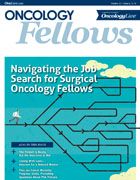Publication
Article
Oncology Fellows
Navigating the Job Search for Surgical Oncology Fellows
Author(s):
As the end of training approaches, the job hunt begins. Below are some tips to follow to make the job-hunting process easier.

Jessica C. Gooch, MD
Start Early:
Make a List of Priorities:
Location, Location, Location:
Finding Job Listings:
Apply Broadly:
Be Persistent:
Interview Preparation:
Interview Day:
After the Interview:
Second Interview:
Salaries, Productivity, and Benefits:
Contract Negotiation:
Enjoy:
As the end of training approaches, the job hunt begins. For many fellows, this will be the first timethey obtain a position without being matched, and the process can be daunting. Below are some tips to follow to make the job-hunting process easier.The process from starting the search for open positions to signing a final contract can take fromseveral months up to an entire year, so it is best to start as early in the academic year as possible. Breast surgical fellows and others in 1-year programs should also try to complete general surgery boards as early as possible, to leave time to focus on the job search and interview process.Think about what variables are important for your career. The experience working at an academic hospital, which is where many young surgeons have spent the majority of their training, will be very differentfrom working in a private practice group. You may wish to investigate whether you will have students, residents, fellows, nurse practitioners, or physician assistants as part of your team. If an academic career is in your future, investigate the availability of resources to support your endeavors—laboratory space, support staff,protected time in your schedule for academic or research pursuits, and access to statisticians are all important variables to consider.Where you will live is also an important consideration, as this affects not onlyyour career but also your life outside work. Location may influence the availability of joboptions for a spouse or a partner. Where you live in proximity to extended family may also play a role. The cost of living, the quality of the school districts, and even the weather may all factor into the decision making.There are many sources for job listings. Professional societies and social media networking groups may maintain job boards. Recruitment services and recruiters may obtain your information toward the end of training and begin contacting you by phone or email with opportunities. Many recruiters contact program directors looking for job candidates, and your director can pass these along to you. Google allows you to save search terms and will send daily email updates with available positions that match your search terms. Word of mouth from colleagues and mentors is also an excellent source of information. Networking at society meetings can be extremely helpful, both for meeting prospective employers and seeking out unfiltered opinionsfrom colleagues and comparing notes with other fellows and job seekers.Depending on the job market, there may not be positions in your ideal geographic location or practice setting. Sending a lot of résumés early on, as well as reaching out to departments that may not be explicitly advertising positions, to see what the market is like may be advantageous. Jobs often go to “people who know people,” so use any connections you have to reach out to potential employers. Program directors, trusted faculty members, and mentors may call or email on your behalf and may be able to advise you about the potential advantages and pitfalls of various positions you may be entertaining. Use caution if sending résumés on paper because of the likelihood that they may get lost on the way to the desk of the intended recipient or buried under piles of paperwork on said desk.This process can be discouraging. When you send your résumé, you may not get a response. Send a follow-up email. Even then, there may be many reasons why you do not receive a response. Occasionally, positions are posted, but there may already be an internal candidate, so there is little chance of an interview offer Sometimes jobs are listed, and then, for any number of reasons, the department is no longer able to offer the position Often a department will interview multiple candidates and then invite select candidates back for a second round of interviews before making an offer. You can expect that multipl candidates may be “first-round interviewed,” which will leave you waiting for some time. Other logistical and more mundane issues may also apply—difficulty wi scheduling, disorganized administration, and the like. Be patient and persistent! This may also be a good juncture to have a mentor or a colleague, especially one who may have personal connections with a department, to call on your behalf and remind the program of your interest.Keep your résumé updated throughout the course of your training by continuing to update presentations, publications, society memberships, and other important details. This can make getting ready for an interview easier when the time comes. Before each interview, take the time to research the background and training of potential partners and also those in affiliatespecialties with whom you will likely be working (for a breast surgeon, the plastic surgeons, radiation oncologists, medical oncologists, radiologists, and pathologists are all important!). Read up on recent publications from the department, if applicable, and review recent news and developments in the field, to beready to discuss any of them during an interview. Although, many interviews are more about getting to know you and figuring out whether the position is a goodfit. In this way, job interviews often are different froresidency- and fellowship-match interviews. Be prepared to discuss hobbies and outside interests; these can be great icebreakers!Many interviews will be multiple-day affairs, including dinner eithe the night before or night after. You can expect the interview day itself to be quite long and include attending tumor boards or departmental meetings to give a clear picture of the style of the program. You may likely also meet department administrators and support staff in addition to the othe physicians. Technically, a prospective employer cannot ask any questions related to your family, personal life, partner or spouse, or current or future children. But if you are willing and able to talk about these things, this may help you and the prospective department evaluate whether the situation is a good fit Your future colleagues may be able to advise you about the quality of the school systems or the availability of family-oriented activities, which may be of significant value when choosing a place to live and work. Being open to discussing family needs may also allow a prospective employer to help with the recruitment process for a spouse or a partner. Two medical spouses seeking recruitment together may want to disclose this information as part of the job-hunting process.Thank-you notes are always a nice touch, and electronic notes rather than handwritten cards are not only acceptable but also substantially increase the likelihood of getting a response and opening a line of communication with the program you are interested in. Spend time after interviews reviewing pros and cons with faculty and mentors as well as cofellows. Other helpful sources may include recent graduates from the institution. This may also help to generate a list of questions to ask on a second interview.By the time the second interview happens, you and the prospective employer will likely have a good idea of whether this job is the right fit for you. Secondinterviews may also involve bringing your partner or spouse with you, interviews or dinners involving your partner, or even exploring the local area with a real estate agent. You may receive a contract offer during or shortlyafter the second interview.As part of the overall job-hunting process, it is a good idea to try to familiarize yourself early on with the expected salary ranges and productivity targets in your specialty and in the geographic area you are looking to work in. Academic and private-practice jobs will have differen responsibilities and expectations built into the contracts, and the salary schemes may also diffe substantially. Information on productivity targets and median salaries for all specialties are available for purchase on the internet, but you can often find ou these numbers by speaking with colleagues who are going through the job-hunting process with you, or recent graduates, or sometimes attorneys who specialize in medical contract review. Sometimes you may also find published manuscripts relate to these data—eg, a survey of breast surgeon salaries was recently published.1 Ideally, you should defer answering the “What salary do you want?” question until you’ve had the chance to review the contract in detail, research the published salary data, and ask for advice from mentors. Equally important to the salary is the productivity target, the length of the guaranteed salary period, and what benefits (which migh include family or parental leave, disability and life insurance, retirement plans, relocation reimbursement, student loan repayment, or a signing bonus) are included.Although it may not seem that there is much room for negotiation for you as a new fellowship graduate (and indeed, there might not be a lot—many university systems come with contracts that are fairly boilerplate in their terminology and contents), there is still some opportunity to tweak the terms in the contract to suit your needs. It is highly advisable to have an experienced attorney look over the contract and help you formulate what, if anything, you are planning to negotiate for. Areas where an attorney may be able to advise you include noncompete provisions, liability insurance coverage, and crafting the language of the contract to accurately define the scope andlocation of your practice. If you have more than 1 offer, you may want to compare aspects of thedifferent offers that you like and see whether yocan negotiate for your ideal balance. At the end of the day, your first contract is not forever, andthere will be opportunities in the future to negotiate again.All your hard work and many years of training have paid off.
Manahan E, Wang L, Chen S, et al. What is a breast surgeon worth? A salary survey of the American Society of Breast Surgeons. Ann Surg Oncol. 2015;22(10):3257-3263. doi: 10.1245/s10434-015-4720-z.

















Latest Conference Coverage

Observation Is a Reasonable Alternative to Adjuvant PD-1 Blockade in Stage IIB/IIIC Melanoma
%20(2)%201-Recovered-Recovered-Recovered-Recovered-Recovered-Recovered-Recovered-Recovered-Recovered-Recovered-Recovered-Recovered-Recovered-Recovered-Recovered-Recovered-Recovered.jpg?fit=crop&auto=format)
Dr Oluwole on CRS and Neurotoxicity Beyond 2 Weeks After Axi-Cel Infusion in R/R LBCL
%20(2)%201-Recovered-Recovered-Recovered-Recovered-Recovered-Recovered-Recovered-Recovered-Recovered-Recovered-Recovered-Recovered-Recovered-Recovered-Recovered-Recovered-Recovered.jpg?fit=crop&auto=format)
Dr Garfall on Ide-Cel and Lenalidomide Maintenance in Myeloma After Suboptimal ASCT Response

Piflufolastat F18 Imaging Is Associated With High Clinician Confidence in Prostate Cancer Management
2 Commerce Drive
Cranbury, NJ 08512






